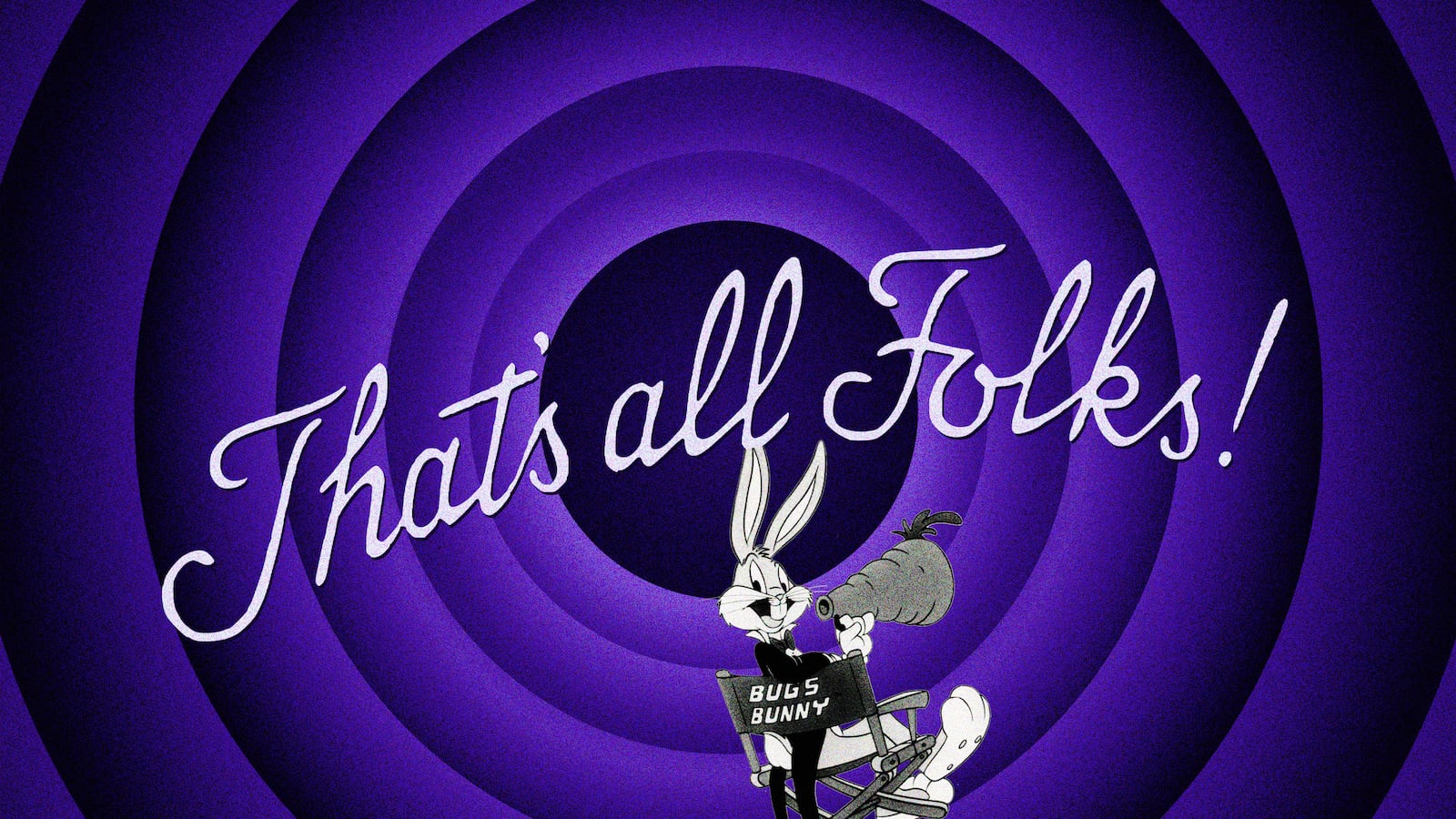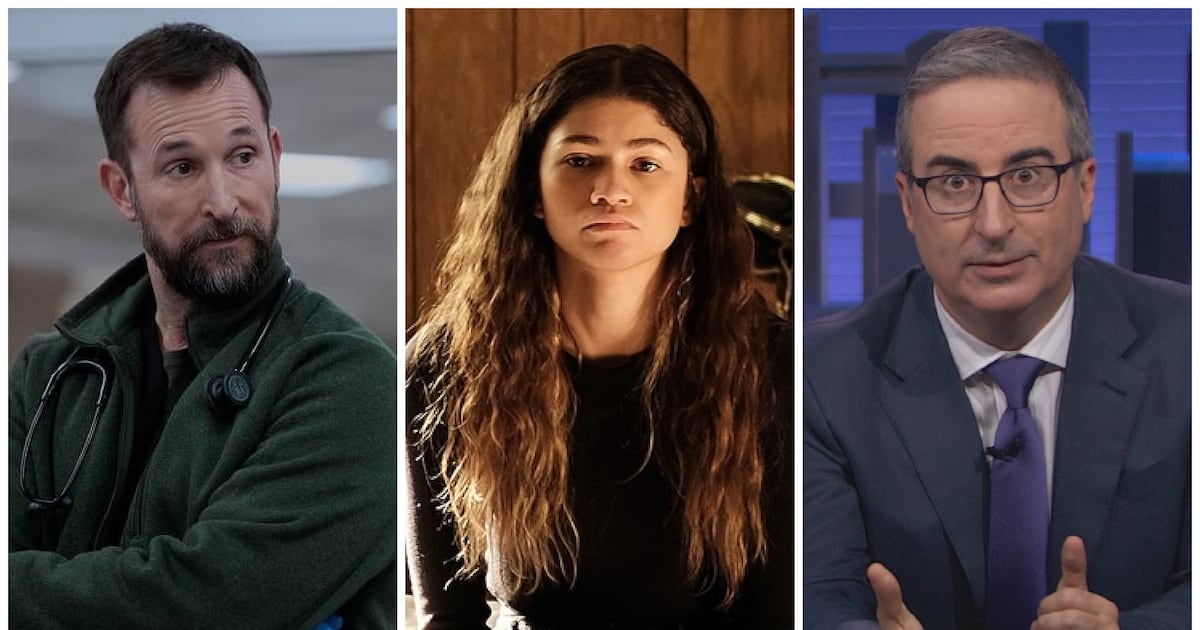In the Looney Tunes short “Duck Amuck,” Daffy Duck does something rare for a cartoon character: He breaks the fourth wall.
What else is he to do, when the off-screen animators are clearly playing tricks on him? Within two minutes, Daffy is thrust from a Three Musketeers parody into a barnyard scene, then a winter wonderland, and finally a Hawaiian paradise—before the setting leaves entirely.
“Look, Mac,” he says to the camera. “Let’s get organized around here. How about some scenery?” A pencil appears, drawing some simple buildings. “How about some color, stupid?” Daffy, unsatisfied, demands next. A paintbrush dumps blue paint on him, then erases his body and replaces it with something Seussian: a polka-dotted torso with a flower around his head.
This meta playfulness carries on for the full cartoon, as Daffy fights against the animator in charge. Starring in cartoons is Daffy’s job, and this off-screen mischief maker is making that job impossible to do.
It’s one of the most daring, funniest cartoon shorts in modern animation history. Kids love it for the silliness of Daffy fighting against pencils, paintbrushes, and the general rules of filmmaking. Adults love it for its self-awareness, creating a surprisingly hilarious romp out of the act of animation itself. And now it’s gone.
Thanks to HBO Max’s huge Looney Tunes collection, families had been able to share “Duck Amuck,” and hundreds of other classic Looney Tunes toons, with each other for what could have been generations to come. But then the controversial Warner Bros. Discovery merger happened, and a complete devastation to animation history followed. Perhaps no loss will be more greatly felt by animation scholars, fans, and newcomers, however, than the Jan. 1 removal of decades’ worth of Looney Tunes cartoons—including “Duck Amuck.”
The platform’s Looney Tunes collection now includes less than half of what it boasted in 2022, as Warner Bros. Discovery removed more than 200 shorts that were released between 1950 and 2004. It’s a confounding decision that can be chalked up to, like all the other HBO Max removals and cancellations in recent months, financial reasons. But Warner Bros. already owns Looney Tunes—how much money is the company really saving by pulling its own, incredibly well-known content off the platform?
Unfortunately, that’s a question that fans of other newly deplatformed Warner Bros. shows like Westworld have been asking for weeks. There’s no good answer, and there’s no telling when we’ll get a chance to easily stream our favorite shows and shorts again. It especially hurts when so many of those shows now lost to the digital ether are animated; Warner Bros. has pulled dozens of animated series, movies, and shorts from HBO Max, which was once a haven for the medium. The future of these shows, which include critical favorites like Infinity Train and Close Enough, now hang in the balance, much to fans’ and creators’ chagrin.
It makes the loss of “Duck Amuck,” in particular, feel so galling. Looney Tunes is one of the most recognizable franchises in animation, if not media. (How many other cartoons can get away with producing not one, but two live-action/animation hybrid spinoff movies co-starring basketball stars?) “Duck Amuck” is one of its most revered episodes, touted by animators and animation nerds as an early example of the form’s potential to be as narratively daring as its live-action counterparts. It’s a surreal comedy masterpiece, animated or otherwise. iIt’s even in the National Film Registry.
And “Duck Amuck” is only one great loss among the now-homeless Looney Tunes shorts. Other fans may point to “What’s Opera, Doc?,” the iconic Richard Wagner parody starring Bugs Bunny and Elmer Fudd in absurd costumes, as an even more shocking removal. In a 1994 survey of 1,000 animation industry workers, “What’s Opera, Doc?” bested “Duck Amuck” to be named the greatest cartoon of all time, and its imagery remains unforgettable.
The similarly beloved “One Froggy Evening,” the musical comedy short that introduced the iconic character Michigan J. Frog, also stands in contention as one of the saddest losses—it, like the other two cartoons, is also in the National Film Registry. Michigan was even WB’s mascot for several years. What a way to fire someone!
This is the trouble of streaming: All content is beholden to the whims of the content owners. This has always been true, even if DVDs and videocassettes made it easier to forget it. But if you don’t still own your old Looney Tunes tapes and want to watch a (legal, high-quality) version of some of the best works in animation history, you’re now out of luck. Until Warner Bros. finds a new way to jack you up for cash to let you watch them again, that is.






